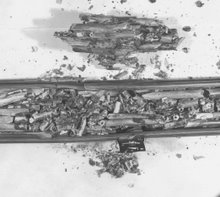Subject: NSF
discourages the real American Innovators
Date: 11/19/2017
1:23:56 PM Mountain Standard Time
From: bobleyse@aol.com
Senator
Risch,
It
is time for funding of our National Science Foundation (NSF) to be
substantially reduced. This past Saturday NSF issued the following
spectacular announcement:
Innovation Corps - National
Innovation Network Teams Program (I-CorpsTM Teams)
However,
it is less spectacular hundreds of words later:
Who May Submit Proposals:
Proposals
may only be submitted by the following:
· Universities and Colleges - Universities and
two- and four-year colleges (including community colleges) accredited in, and having
a campus located in, the US acting on behalf of their faculty members. Such
organizations also are referred to as academic institutions.
Briefly
Senator, I know a lot about the NSF. For example, I took my
discoveries to UCLA and we jointly submitted a proposal to NSF. It
was rejected. So, without my awareness, UCLA submitted an
essentially identical proposal on its own and it was
accepted. I then submitted my proposal and it was vehemently
rejected. The academicians resent significant discoveries that
originated outside of their turf. Following is one of the three
reviews that is far more vindictive than objective; as well as being loaded
with errors. Furthermore, NSF will not disclose the identity of that
reviewer and that is tyranny.
· Proposal Number:
|
1132890
|
|
Proposal
Title:
|
Proprietary
Transformative Separations
|
|
Received
by NSF:
|
03/01/11
|
|
Principal Investigator:
|
Robert
Leyse
|
Review #3
|
Proposal
Number:
|
1132890
|
|
NSF
Program:
|
THERMAL
TRANSPORT PROCESSES
|
|
Principal Investigator:
|
Leyse,
Robert H
|
|
Proposal
Title:
|
Proprietary
Transformative Separations
|
|
Rating:
|
Fair
|
REVIEW:
What
is the intellectual merit of the proposed activity?
The most compelling portion of this proposal is that the PI has identified an anomalous boiling heat transfer regime from microscale wire surfaces. Unfortunately, the PI has not presented a convincing research plan that will lead to a fundamental understanding of the heat transfer process he has identified. Countless anomalous regimes have been identified in boiling heat transfer. While the PI believes that his discoveries are transformative, this Reviewer fails to see it. Truly transformative research will seek to explain the physical mechanisms driving the anomalous observations, and provide technologists with the understanding that may lead to technological advances. However, the PI fails to mention any of the various physical boiling phenomena at different length and time scale which may influence the process. For example, the PI claims his measurements are steady state. This completely ignores the time scales associated with ebullition. The PI claims the dispersive mechanism is turbulence without any evidence. It can just as easily be hypothesized that the dispersive mechanism is microbubble growth and collapse that has been observed in highly subcooled systems. It is unfortunate that the PI has expended so much effort to convince NSF to fund his proposed research. If the PI is convinced that his discoveries are transformative and can lead to revolutionary new technology, he should focus his efforts on developing that technology. For whatever it is worth, this Reviewer believes that the heat transfer behavior observed is confined to microscale wires, and attempts at scale-up would not be fruitful. What are the broader impacts of the proposed activity? It is difficult to identify broader impact associated with the proposal. Summary Statement Past Reviewers have been too gentle in pointing out the weaknesses of the proposed study. The PI should not be encouraged to resubmit a proposal covering the core topic. |
Senator,
this past Saturday’s Wall Street Journal has a significant discussion on page
A11, Trump vs. the Deep Regulatory State. It is time for
an equivalent discussion of how the NSF has become dominated by assorted forces
to the disadvantage of the real American innovators.
Robert
H. Leyse

No comments:
Post a Comment